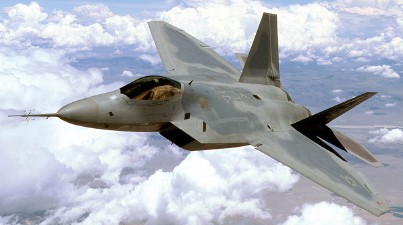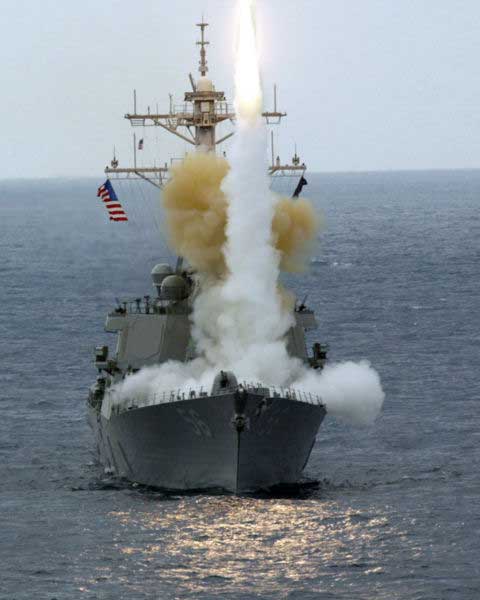Defense News
Defense News describes itself as “the authoritative, independent, professional news source for the world’s defense decision-makers.” Reaching a “highly selective VIP list of top leaders and decision-makers in North America and in Europe, Asia and the Middle East,” it “provides the global defense community with the latest insight and news analysis on defense programs, policy, business and technology.
Bristling with moving images of planes, tanks and rockets, and headlines like “U.S. Army and Marine Corps Testing New Laser-Guided Helo Rockets” and “Russia To Upgrade Topol-M ICBM in Coming Years,” and ads for the likes of ITT enjoining readers “In the conflict’s defining moment, be defined as the victor,” the May 7th issue contains a number of stories pertinent to US-Japan relations. One reports on a threatening letter, containing a razor blade, to Japan’s Defense Minister Kyuma Fumio for failing to take a harder line against the US. Below we present a story that illustrates a changing mood in some quarters with respect to the US-Japan strategic relationship.
The $339 million F-22, built by Lockheed Martin, is widely considered the most advanced air-superiority fighter in the world. With electronically scanned array radar for cruise-missile detection, it is capable of eluding advanced air defenses to bomb ballistic-missile launch sites. With a 2,000 kilometer operation radius, it has the capability of flying at 65,000 feet, higher than other fighters. However, the deal is caught up in regional conflicts whose origins can be traced to the era of war and colonialism and the continuing memory wars involving Japan and its neighbors. Japan wants to purchase the F-22 and it is prepared to pay royally. But there are complications, from criticism by some of Japan’s neighbors to the Obey amendment which prevents sale of state of the art technologies critical to US hegemonic power. Japan Focus
A Time for Honesty
Arms sales, especially when they introduce new capability to a region, demand careful consideration to ensure exports don’t destabilize the area or spark arms races.
Japan wants F-22 stealth fighters, but Washington is resisting, in part because of legislation banning Raptor exports. Yet there is worry in South Korea, a nation still embittered by Tokyo’s past sins. South Korean officials say if Japan gets F-22s, Korea needs similar planes to defend itself.
After decades of post-World War II cooperation, the notion that South Korea sees Japan as anything but an ally should be a wake-up call for Tokyo and Washington.
The issue isn’t the F-22. Nationalism is on the rise across the region. For Japan’s neighbors, the issue is rise of nationalism and historical revisionism simultaneously as Tokyo expands its security role to match its status as an economic superpower.
Spurred by Washington, Japan has turned its self-defense agency into a full-fledged ministry of defense. Discussion flows about once-taboo subjects, including whether Tokyo should export arms, develop offensive weapons, launch pre-emptive strikes or even buy nuclear systems.
Japan sees itself as the world’s No. 2 economy, a good, democratic neighbor that over the past six decades has been a pillar of regional stability. Its investments across Asia – forgotten by some – have contributed to the prosperity of nations like South Korea and China.
Tokyo was the first to co-produce top-of-the-line U.S. weapons such as Aegis destroyers, and it’s logical that Japan would want the F-22 superfighter. Better self-defense forces also make sense in the face of Chinese military incursions into Japanese territory.
Washington’s zeal for a more militarist Japan, however, shouldn’t come at the expense of honesty. U.S. officials are getting increasingly concerned over the regional impact of Japanese revisionism.
Renowned scholar Francis Fukuyama said it best in a recent commentary published in Lebanon’s Daily Star: “America should be careful about what it wishes for. The legitimacy of the entire American military position in the Far East is built around the U.S. exercising Japan’s sovereign function of self-defense. Japan’s unilateral revision of [its constitutional ban on offensive military operations], viewed against the backdrop of its new nationalism, would isolate Japan from virtually the whole of Asia.”
Fukuyama is right. It’s time Washington quietly reminds Tokyo that its actions could undermine its own security.
Japan’s first postwar defense minister, Kyuma Fumio, last week worked to reassure his neighbors. He stressed postwar Japan’s pacifist tradition, and said he opposes arms exports or development of offensive weapons.
The question is whether Kyuma’s boss agrees. Prime Minister Abe Shinzo is considered a patron of the revisionist movement, recently enraging Koreans by denying – in the face of overwhelming evidence – that Japan had forced Korean women into prostitution during its four decades of occupation.
As a sovereign nation, Japan, like its World War II ally Germany, should be free to play a global security role.
The difference is that Germany has confronted its wartime past, apologized for its actions and continues to atone through reparations to those who suffered.
Japan must take its rightful place as a world leader, but it must acknowledge its past. Washington must not rush Japan’s security evolution because in doing so could cause the very instability it seeks to prevent.
This article appeared in Defense News on May 7, 2007 and at Japan Focus on May 10, 2007.





